Why is Josh Cavallo top soccer’s only openly gay male player?
It took years for Adelaide footballer Josh Cavallo to work up the courage to say ‘I’m gay’. Why is it still taboo in men’s sport?
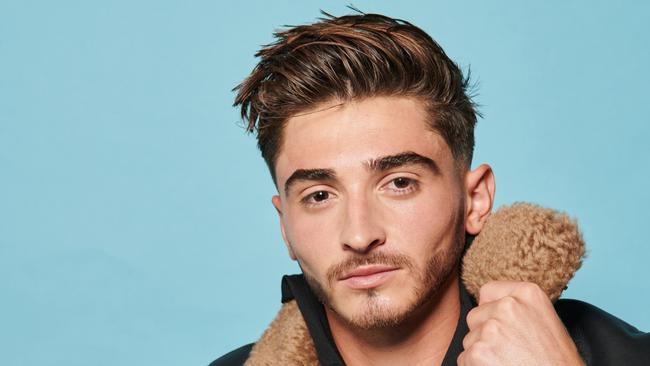
Josh Cavallo didn’t know Thomas Beattie, but desperate times called for desperate measures. The young A-League footballer’s life had become so miserable he was ready to share his deepest secret with a stranger from the other side of the world.
Cavallo was sick of living a lie. Tired of being fake. But he was also terrified that if anyone learnt the truth about him, his ability to play the game he loved – and his career – would be over. After all, he could not find one current player in the top leagues of men’s soccer anywhere in the world who had openly admitted to feeling as he did.
The athletic left back for Adelaide United fancies men, not women. At 16, the realisation had caused confusion and turmoil. At 21, he’d accepted he was gay but feared nobody else would: being gay and playing football didn’t go together. So he kept his secret, even as it fed growing paranoia and isolation. He needed advice. He wanted a role model. While he could find no gay male players, there were some who had come out after their careers finished. “And one that struck me was Thomas,” Cavallo says.
Beattie was a former English professional who had also played in North America and Singapore. It was only after a severe head injury ended his career prematurely that he revealed his sexuality. “I really wanted to talk to him,” Cavallo says. “He’s walked my path. He knows what it’s like.”
Yet the layers of disguise Cavallo had built up over years would not shed easily. Time after time, after tapping out his Instagram message to Beattie, he’d be hit by a wave of panic and delete it. “Then I bit the bullet, I sent it to him,” he says. “And within two minutes he’s opened it. He was in Miami [in the US]. He got back to me and said, ‘Josh, I feel like you’re telling my story to me.’ And from there we jumped onto FaceTime.”
Cavallo is telling me this with a big smile across his broad, bearded face as he sips a drink in an Adelaide cafe. These days he’s bright and bubbly, and now that the dam has broken his story tumbles out, a remarkable tale of how he became the first top-level male soccer player in Australia to come out as gay – and the only one worldwide now playing. (It’s not just the case in soccer – try finding any openly gay players in men’s Aussie rules or either of the rugby codes.)
His announcement, on October 27 last year, caused a sensation. While gay players are commonplace in women’s football, for men it has remained taboo. The young man smashed that, ending his two minute 50 second video – now with more than 11 million views – with a straight-to-camera statement: “I’m Josh Cavallo, I’m a footballer, and I’m proud to be gay.” In the first half-hour after he and the club released the announcement on Twitter and Instagram, he received more than 700,000 responses. Big names like Barcelona’s Gerard Piqué, Manchester United’s Marcus Rashford and French World Cup winner Antoine Griezmann sent support, as well as big clubs such as Liverpool and celebrities from Ricky Martin to Ellen DeGeneres.
Cavallo was thrilled. He was soon better off financially, too, when Ralph Lauren flagged its inclusivity chops, keen to hang a new line of sports clothing on his compact frame in time for the Australian Open tennis. Still adjusting to his newfound fame, Cavallo, 22, wants to be the role model he never had. He intends to fight prejudice against LGBTQI+ people. He wants to keep pressure for change on 2022 World Cup host Qatar, where homosexuality is a crime – he may visit this year at the invitation of the government.
He also wants to focus on those who ask him for help. “I don’t care who these people are, I will reply to them,” he says. “Because I know the pain that they’re going through. I know what it’s like to be in their shoes, to be voiceless, to not feel like you could trust someone to tell them the real you.”
Cavallo grew up in Melbourne’s south-east where his parents – his dad has Italian heritage and his mother Maltese – ran an Autobarn store. His first love was tennis and he dreamt of becoming a professional. But his older brother Christian loved playing football and around the age of 11 he started to join in.
He was a natural. Soon he was playing for the local Brighton club, and then quickly made representative teams for Victoria. At 16, he joined A-League club Melbourne Victory’s youth team, then went to Melbourne City on a scholarship, and later won his first professional contract with Western United. He also made the national under-20 team, the Young Socceroos.
But it was at Adelaide, a club known for backing youth, where he shone after moving there in the middle of the 2020-21 season. He started most games, and last June, at the end of the season, the left-footer won United’s best young player award. That night, instead of celebrating with teammates, Cavallo returned alone to his apartment and cried. “People dream of winning awards like this – and I was sad,” he says. “It just really upset me that I couldn’t celebrate with my peers and my friends. My Adelaide United team are my family, my brothers, and it hurt me a lot that I couldn’t be myself with them. They all wanted me to come out that night and enjoy myself, but I wanted to go home because I didn’t want to socialise and get caught up and say something.” He feared he’d let slip, that someone would realise he was gay.
It was the same reason he’d arrive last at training and leave first. Practice had made him a good liar, but he worried someone would catch him out. “I just knew I had an attraction towards guys,” he says. “I grew up thinking you have to have a wife, you have to have children – traditional, that’s the way my family brought me up. I was very confused, and thought I was maybe going crazy.” Some players did ask if he was OK. “I just didn’t show my cards,” he says. “I said, ‘Yeah, everything’s fine, there’s no problem’ – but then, I’d be crying myself to sleep.” The awards night was a spur. After the season, back in Melbourne, he started to do some research. “My mind was in bits because I was like, I don’t want to live this way,” he says. “I want to be myself and I still want to play football.”
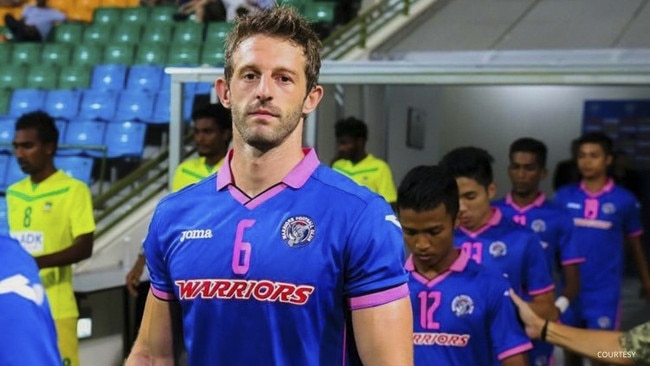
He told Beattie in that long Instagram message: you won’t know me, but I’m struggling and need someone to talk to. Beattie, 35, who had come out one year before, recalls he’d just sat down in a rare quiet moment when the message popped up. It resonated. “I think he was just me, maybe 10 years earlier,” Beattie says. “He was super lonely. I obviously wanted to reach out to him straight away and… make sure he was OK. It’s such a vulnerable position to be in. But I was excited for him just having someone to reach out to, because that was something I never had. As a [gay] athlete you feel like you’re literally alone in the game.”
Cavallo didn’t feel the weight fall from his shoulders after that first chat, but he could see a gleam of hope. “We just connected straight away,” he says. “He understood me. I understood him. It was an amazing feeling. I’ve never experienced it in my life before. I understood, OK this is normal, I’m not different. I don’t need to keep fighting what I feel naturally. It was like I got to be the real Josh Cavallo. It was awesome. And I was getting glimpses of that, but I wanted the full time of that.”
Beattie, now a successful entrepreneur operating between Singapore and the US, introduced Cavallo to his Los Angeles-based manager David McFarland, a former US elite swimmer now “out and proud” and familiar with the challenges of LGBTQI+ athletes. McFarland mixes a background in the entertainment business with work on suicide prevention and social justice issues. He’d helped Beattie and other top athletes come out, including NFL player RK Russell, the first top-level American football player to declare he was bisexual while still active in the sport.
Cavallo’s decision was courageous, McFarland says. Plenty of people say to him about gay athletes: “What’s the big deal? He’s gay – we don’t care. If they can play, they can play.” But McFarland doesn’t agree. “I’m like, well clearly it’s a big deal, because if it weren’t a big deal, everyone who was gay would be out.”
Cavallo had begun to expand the circle of those who knew his secret. Things were coming to a head. He’d just signed a two-year deal with Adelaide, and he didn’t want to live like this for all that time. It was also hurting his game. “When I’m out on the soccer pitch I was thinking about what I was going to say to my teammates in the change room,” he says. “If they asked me a question about a girl, or what I’m doing, who am I seeing – these were the worries I was having when the ball was coming towards me.”
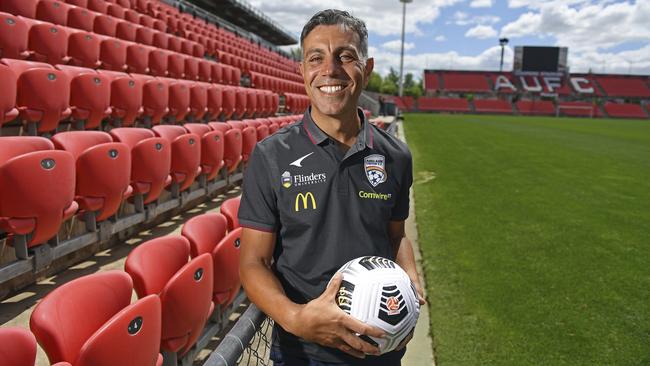
Ross Aloisi, Adelaide’s assistant coach, could sense things weren’t right when Cavallo returned from Melbourne for pre-season training in late July. He admired the player’s fitness, aggression, and left-footed skills – but he wasn’t focused. “I know you’re a quiet kid,” he told him. “I know that when I spoke to you in the past you listened, you looked at me. I’m speaking and we’re doing tactical work at training, and you’re looking at the sky.”
Cavallo denied it, but Aloisi believed he was unhappy and wanted to return to Melbourne. Then three weeks later, early on a training day, Cavallo asked if they could speak. Aloisi assumed he wanted to go home and called him into his office. “Sit down, you’re not going back to Melbourne – get that out of your head,” he told him. But Cavallo said he didn’t want to go back. “So I said, ‘Look, have you got some mental health issues?’ and he says, ‘No, it’s worse than that’. And I say, ‘What could be worse than mental health issues?’ And he says, ‘I don’t want to tell you’. And I have no idea. And he goes, ‘I’m gay’.” Aloisi was stunned that this was the source of the worry. “That’s good!” he told Cavallo, reassuring him and trying to lighten the atmosphere. “It’s better than having mental health issues!”
Aloisi told Cavallo he was like a son to him. “Coming out that you’re gay doesn’t change the person you are, you’re still a fantastic kid’,” he told Cavallo. “Whatever you want, whatever you need, we’ll be here for you – we’re behind you 100 per cent.” Aloisi still becomes emotional about what happened next. “Little did I realise how much he’d been going through,” he says.
The pair spoke privately for about 45 minutes, Aloisi asking the questions. The more he asked, the more he realised how much pressure Cavallo was under. “When you see fear in their eyes, it was horrible,” he says, his own eyes red with tears. “That’s why I get emotional… because I saw the fear. The fear of what people would say. The parents feared that he would never play, and all he wanted to do was play football. No one should go through that in their life.”
Aloisi wanted to help. Later, as time went on, he called Cavallo’s parents, who had not known their son was gay until the off-season (a subject the player won’t discuss). It was a difficult conversation. “The dad said to me, ‘Who is going to protect my son?’” Aloisi says, shaking his head and choking up with the memory. He pauses for a moment. “And I said to his dad… ‘I’ll protect him’.” But, he adds, there’s only so much he can do to protect against “social media idiots”.
That first morning, when head coach Carl Veart walked into the meeting, he echoed Aloisi’s reassurances and told Cavallo he was proud of him. Veart had always felt something wasn’t right since he had worked with him as assistant coach for the Young Socceroos. “There was always something holding Josh back… something that you could never put your finger on,” he says. That morning “a lot of the questions that we had just fell into place, and then it was about how we can support Josh”.
Cavallo recalls getting big hugs from his coaches – both ex-Socceroos with international careers – and walking out with a huge sense of relief. They didn’t see him as weak, as he’d worried, but courageous. “Still to this day when I close my eyes I see the weight come off my shoulders,” he says. “I had the best [training] session of my life that day. I ran rings around everyone… because I just felt free.”
Veart told the club’s chief executive Nathan Kosmina about Cavallo the following day. Kosmina says he felt “joy and happiness” that Cavallo had been comfortable enough at Adelaide to be himself. He says there were two strands to the club’s efforts – helping Cavallo come out publicly, and ensuring there was a legacy. On the latter front, the club planned a double-header at home for the men’s and women’s teams. Played on February 26, it became the A-League’s first Pride Cup game, with the aim of boosting inclusivity by encouraging sports participation for LGBTQI+ people.
But back in August last year, Cavallo’s coming out was still a work in progress. He spoke many times with Beattie and McFarland, looking at what to expect in the best and worst-case scenarios, and understanding that once out, there was no going back. Beattie told Cavallo that from his own experience he could expect 90 per cent support and 10 per cent disapproval, some of which would be vocal. “It takes so much courage,” Beattie says. “He knew going into the process that he was going to get that, and he walked that path alone, especially in Australia as the sole male [top-level footballer].
“He’s carrying that figurative baton alone and that’s quite daunting and scary. It also means he’s the battering ram for the… minority who do have something to say. There’s no soldier [standing] next to him. He’s alone in the trenches.”
Cavallo came to believe it was what he had to do. Being open was bigger than football. Whatever the reaction, he’d be winning by being himself.
“Freedom Day” was planned for October 27. The number was special to him. His parents had married on the 27th, his beloved grandfather and “best friend” John Camilleri had died on the 27th, and 27 was the number on his shirt.
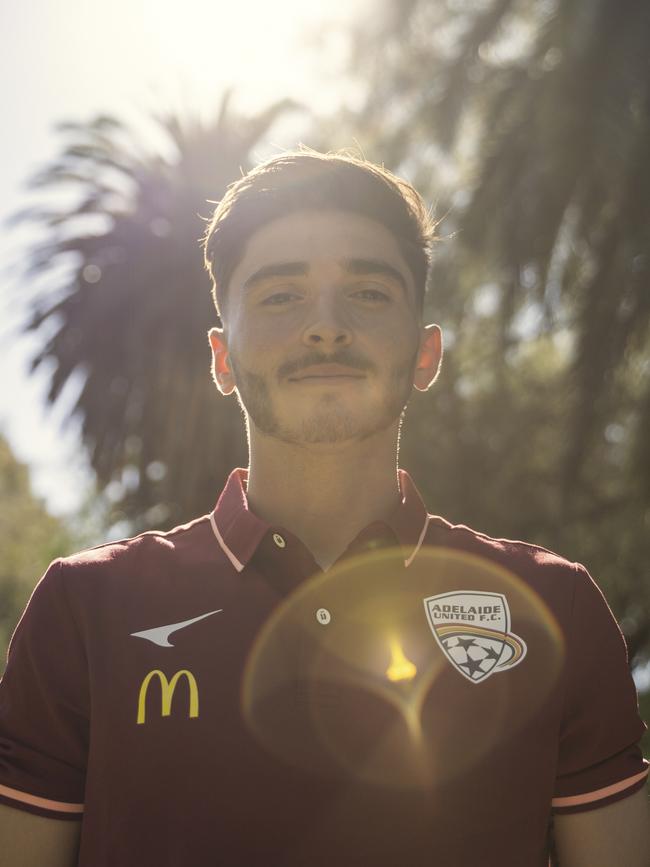
In the days before, the club’s marketing team were added to the circle and the video of Cavallo was filmed on the 26th. Titled Josh’s Truth, this was no iPhone job: the player was shot at home, in colour and black-and-white, from multiple camera angles and with soft background music to reinforce his emotional message. Thirty minutes before it went out, Cavallo told his teammates. Goalkeeper Joe Gauci recalls they had just finished a training session. “No one had any idea what it was about, not even the boys who were close to him,” Gauci says. “But he said, ‘I’m gay’. It was a bit surreal, but at the same time it was normal. We just got around him and said, ‘We’re here to support you’, and we moved on. I think we had gym afterwards.”
Gauci says it was only the next day that he realised the significance of what had happened. “Once it had gone worldwide and I saw the response from everyone, it was truly unbelievable, and it made me very proud to be a part of it.” And Cavallo now? “He’s a lot more outgoing,” he says. “I get the sense he’s way more comfortable. I think that’s the most rewarding thing, seeing him being able to be himself and be comfortable around us – like he said, he’s been able to be his true self.”
Cavallo agrees. Regardless of whether it turned out to be a positive or negative for his football career, “I’m happy at the end of the day because I get to be who I am. I’ve got the biggest smile on my face now because I don’t have to worry about something I’ve been paranoid about for years. It was almost like being imprisoned in my brain.” These days, “I don’t have to think twice before I say something.” And when the team wins, he can let his hair down with the other players afterwards. “It’s just awesome. That stuff I haven’t experienced because I’ve always been holding myself back.”
There has been some awkwardness. Some players have gone out of their way to be extra polite, he says. “But I said, ‘I don’t want you to change who you are’. There was a joke in the changeroom and the word ‘gay’ slipped out. Someone said, ‘That looks gay’, or something like that. I was right next to them, and the boys went really uptight. One of the players came up and apologised but I laughed – this was banter. We can still have a joke and a laugh; like, I’m human.”
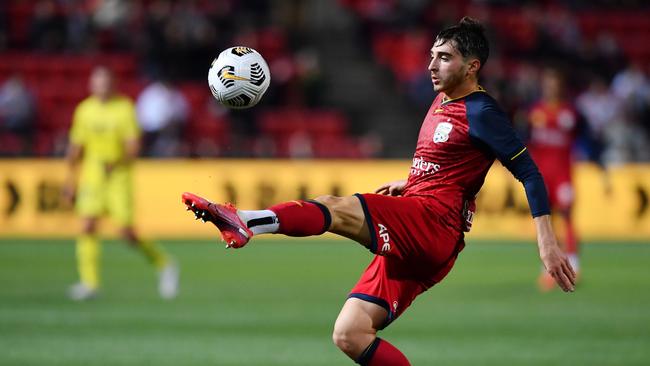
Cavallo is now one of the country’s highest profile players, with steady demand for interviews from around the globe. But there’s been a price. He did cop homophobic abuse at an away match against Melbourne Victory in January and death threats that police are investigating. He heard the insults but ignored them during the game. “I knew in my career I’d definitely experience something like this,” he says. “And I prepared myself mentally that when I’m on the pitch I’m a professional footballer… and I didn’t show any emotion on the field. It was when I was in my hotel room that it kind of kicked in. And the messages started coming through and other death threats and it was quite confronting. That did hurt.”
Melbourne Victory was fined $5000 over its fans’ behaviour and committed to banning the perpetrators. Cavallo’s club thinks the abuse, and the fines and bans, have drawn a line in the sand for spectators. Cavallo’s own counter was to challenge social media companies to toughen verification requirements. “If your name is linked to an account that can be traced, I don’t think people would say the things they say,” he says.
He’s not backing down from his push for greater inclusivity. He slams proposed federal legislation, backed by Prime Minister Scott Morrison, that would ban transgender women from competing in women’s sport. That is the same as racism and homophobia, he argues. Hearing powerful people like the PM say trans athletes should be treated differently “breaks my heart because that could have been me or could have been someone I love”.
On the professional front he is not having the same impact as he did last season. Hit by Covid at Christmas, he lost his starting position in the team, and has mostly come on late in games as a substitute. Still, he’s positive. He says his game is growing now his mind is focused on football. One ambition is to play US Major League Soccer.
Will Cavallo’s bold move really change things for other sportsmen? There have been few big names who have come out. Manly rugby league hard man Ian Roberts was a rare case in the mid-’90s, although most people in the game already knew. Swim star Ian Thorpe denied he was gay before reversing that in a 2014 TV interview. In rugby union, former Wallabies prop Dan Palmer told in 2020 of the mental anguish of keeping his sexuality secret for many years. In soccer, perhaps a dozen or so top male players have come out, and only a few while playing. English star Justin Fashanu, who played briefly in Adelaide, came out publicly after his career, but killed himself aged 37. American Robbie Rogers came out in 2013 and retired from football, before deciding he was being a coward and returning to play Major League Soccer. Collin Martin, then 22, came out in 2018 while playing MLS, but is now in a lower league. (In 2019, former Australian A-League player Andy Brennan came out while playing at a lower level.)
Yet there are many “out” gay women playing top-level football, from the Matildas down to club level. Former Matildas player and ex-FIFA executive committee member Moya Dodd says one reason might be that women who played football in past years were considered outsiders who didn’t belong in a game for men. “So you’ve got a bunch of people who are not afraid to make their own choices in life, regardless of what other people say,” says Dodd, who is gay. “So it’s not surprising that you would find that this is a safe space for the gay and lesbian community.”
Having gay people in the change room doesn’t turn straight people gay, she stresses. “I grew up around a lot of straight kids at school and at church… and that didn’t turn me straight.” But she believes Cavallo’s decision will influence gay men. “A lot of people in football thought, ‘Thank God – finally, finally, maybe it’s going to be easier for the next person and the next person’.”
That’s a point echoed by the captain of Adelaide’s women’s team, Isabel Hodgson, who came out in her late teens. Now 25, she says she always found football to be a safe place. “When I was 17, playing here at United, in our team was an older player from Norway who was married to a girl and had a baby,” she says. “And I remember thinking at the time, ‘Wow, she’s out, she’s gay, she’s married, has a kid, and she’s a professional soccer player’. And I looked at that and I am going – if she can do it, I can do it. That’s probably the biggest difference: we had role models.”
Beattie knows the impact that a male sportsman coming out can have. His announcement helped pave the way, through McFarland, for US alpine ski champion Hig Roberts to follow suit. But at a more private level it gives people heart, and saves lives. In the LGBTQI+ community, the “the suicide rate is super high”. “Someone, somewhere, thinks that they’re better off dead than for people to know who they are,” he says. “Josh’s coming out will affect many people in ways you’ll never hear about.”
Cavallo is ready to take that on his shoulders. “I want to be a role model,” he says. “I hope through what I’ve done, it can help pave the way for younger people not to experience what I did. I hope in 10, 15 years’ time… it’s just normal, like in the women’s game. Why not? We see gay people in the street and we don’t say anything, so why are we saying that in football?”
Lifeline 13 11 14

To join the conversation, please log in. Don't have an account? Register
Join the conversation, you are commenting as Logout